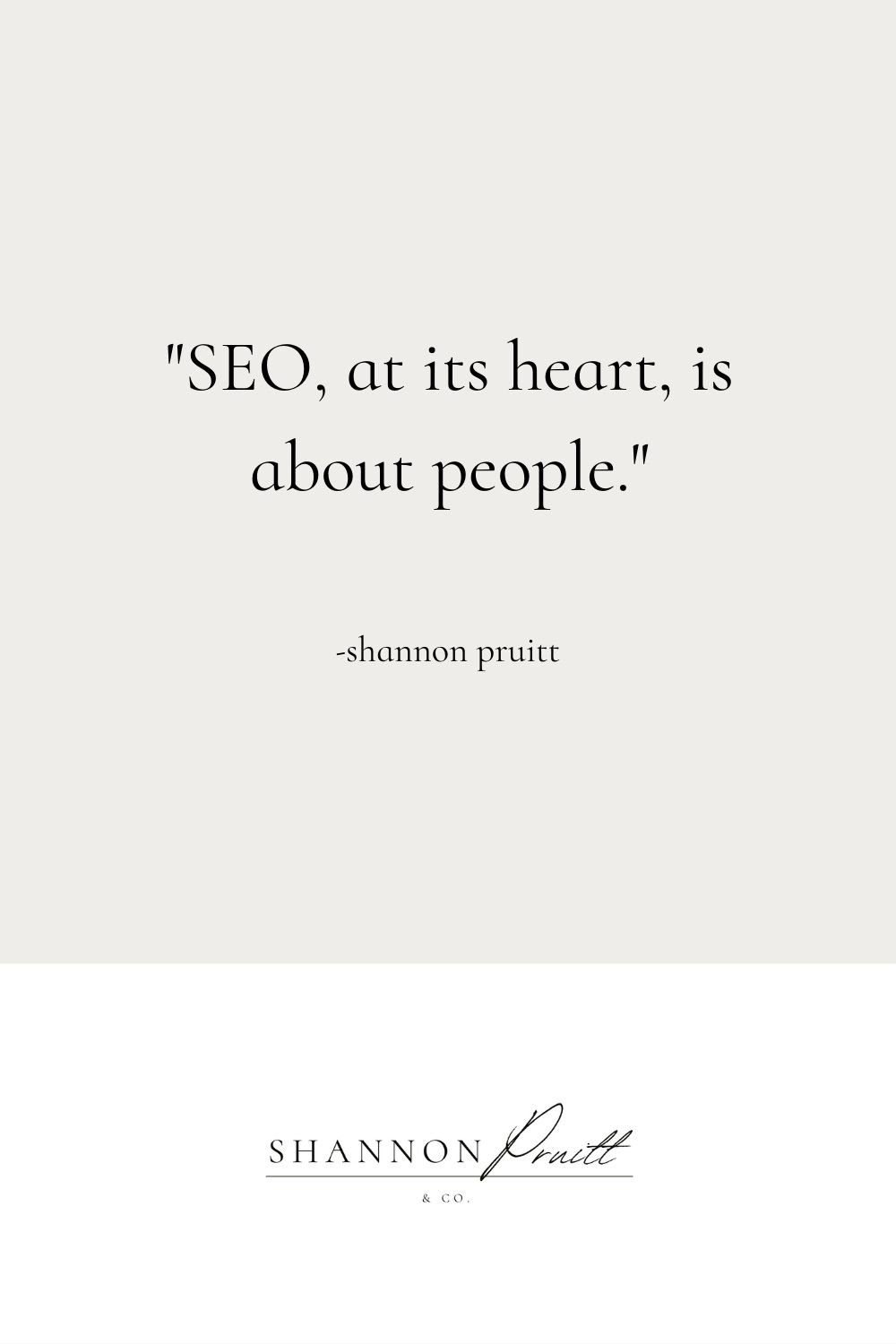A Simple Guide to SEO Basics
One of the biggest struggles business owners and entrepreneurs tell me they have is understanding and implementing SEO in their website and social media.
I get it. It’s frustrating. Especially when you have a business to run.
And even more especially when you don’t have a tech background or understand techy things.
So I’ve made a simple guide to understanding and implementing SEO for you. I’ve also taken some FAQs from my social media followers and email list subscribers, and answered those for you below.
I’m hoping to take you from this…
to this…
In this blog post, you’re going to learn:
What SEO is
Why SEO is important
A brief, simple explanation of how SEO works
What matters the most when it comes to improving your SEO and ranking
How often to update your SEO
My favorite SEO resources
What exactly is SEO?
SEO stands for “Search Engine Optimization”. It’s the combination of having quality and frequent traffic to your website. It also includes your brand exposure through organic search engine results.
And honestly? SEO, at its heart, is about people, too. Because if you understand what people are searching for online, you’ll be able to create content and solutions that they want to consume and take part in. If you know the words people are searching for, you’ll be able to create better quality content for them.
Think about it: Whenever you personally need to find the answer to something, you type your question or topic in Google (or another search engine), and you scroll and click until you find the answer(s) you need or trust.
Everybody is doing that same thing.
And search engines need to be able to take alllllllll of the content that’s ever been created online and “crawl and index” it. Then those search engines have to prioritize that content by how well it actually matches whatever people are searching for (aka, the “ranking”).
This is why people use keywords and implement other SEO good practices. They want Google to find their website and rank it high. Because the higher a website is ranked, the more traffic it’s going to get. (How many times do you actually go to the 2nd page of a Google search?)
Why is SEO important? Why should I care?
Because most of your website traffic is likely coming from search engines. Yes, social media is probably generating traffic to your website, but most of it is coming directly from search engine results.
How does SEO work?
Google, Yahoo, Bing, and other search engines do 3 main things:
Crawl (looking all over the internet for content and code)
Index (organizing the content they find and displaying it)
Rank (ordering the content by most relevant to least relevant during someone’s search)
To make sure your website is actually getting indexed, type “site:yourdomain.com” into Google… you’ll see the indexing results Google has for your website. Whatever number of results you see can give you a general idea of which pages are being indexed and how they’re actually showing up in searches.
However, I highly recommend that you set up an account with Google Search Console to monitor your website. (This is something I set up for all of my Squarespace Web Design clients, btw).
There are a lot of ways to make sure Google is correctly crawling and indexing your website, but that’s for another day. If you don’t want to wait on me to explain all of those, then be sure to check out my top SEO recommended resources at the bottom of this post to do your own digging.
How does search engine ranking work?
This was one of the questions one of my email list subscribers sent me. The short answer is algorithms.
I know, I know. Another piece of technology using algorithms.
But here’s the thing: Google, as well as social media platforms, make adjustments to algorithms daily. Sometimes they’re minor. Sometimes they’re big adjustments.
The reason for all the adjustments is usually to improve the overall quality of the platform (and honestly… probably to make money… because, let’s face it… Google, Instagram, Facebook, etc…. they’re all businesses. And like all businesses—they want to make money).
But in regards to ranking, there are several things search engines look at for ranking purposes:
Crawl accessibility so search engines can read and find your website
Inbound links (aka “backlinks”)
Quality, compelling content that actually answers your visitors’ search topic
Optimized keywords (without overdoing it)
Fast loading speed and good web design
Title tags, URLs, meta descriptions, and alt text
Clicks (the number of clicks your website actually gets from a search)
Time on page (the longer someone stays on your website = the better)
Bounce rate (the percentage of website sessions where users view only one page on your site)
Pogo-sticking (when someone clicks on a website just to quickly go back to the search engine results to click on another site)
What matters the most for SEO?
There are two big aspects of SEO that are incredibly important across any website: CONTENT and INBOUND LINKS.
Your content plays the biggest part when it comes to search engines like Google, Yahoo, and Bing to finding you and considering you relevant. My gosh, even Google comes right out and says it:
“Creating compelling and useful content will likely influence your website more than any of the other factors discussed here. Users know good content when they see it and will likely want to direct other users to it. This could be through blog posts, social media services, email, forums, or other means.
Organic or word-of-mouth buzz is what helps build your site's reputation with both users and Google, and it rarely comes without quality content.” (Google)
Inbound Links are also important, coming in as a close second to your content. Inbound links are links from another website that are taking people to your site. The more quality inbound links you have, the higher your website will rank in search engines. Not gonna lie—getting those quality inbound links is hard. You might want to consider guest blogging for others or getting featured on another website (cough, cough… wedding pros: this is where submitting your weddings and styled shoots to publications can really help you out).
The bottom line is that quality content and quality inbound links both drive traffic to your website, and the more traffic you have on your website, the more Google, Yahoo, and Bing are going to like you.
So what do I do now?
Submit your site to Google Search Console.
Be patient. Crawling can take anywhere from a few days to a few weeks. Use the Index Status report or the URL Inspection tool in Search Console to monitor the progress.
Look at my top SEO tips below.
Got any tips to improve my SEO?
Yep. Honestly, there are a lot of things you can do, but here are some basic things for you to consider:
Blog. Add Content. And make sure it’s quality and valuable.
Add content that relates to the keywords you want to show up for when someone searches for it. Want to know how to do this? Google those keywords. See what the top pages are ranking for when you search those keywords. Figure out what content those pages have. Create content that’s better and more valuable. Want detailed help with keyword research including a free keyword research spreadsheet to stay organized?
Use headings and subheadings in your content.
Use bullet points and numbered lists.
Stop writing incredibly long paragraphs.
Do what you can to get other sites to link back to your site. Offer to guest blog. Try to get featured on other sites.
Stop with the keyword fluff. Yes, you need to use keywords, but you need to use them so they sound natural and make sense. My biggest tip here? Write to a person. Stop trying to write for a search engine.
Try deep linking. Yes, you want to link to other pages on your website, but have you linked to a specific passage or a specific spot on a specific page? Try it.
For images, if it requires animation, use a GIF. Use jpeg or jpg for most other images, and make sure the size is <500 KB. If you need a high-resolution image, use PNG.
For images, type alt text. Alt text is the text that describes an image for a visually impaired person. Just make sure your alt text actually describes what’s going on in the image.
Make sure your URLs are clear and simple.
Use hyphens to separate words in your URLs.
How long does it take to see better rankings?
This isn’t an overnight thing. Depending on your website, it can take anywhere from 3-9 months before you start seeing new rankings. And that’s with dedicated and intentional SEO practices.
Is SEO something that you should be updating periodically, or is it something that is “one and done”?
Well.. hopefully you know the answer after reading this post, but: it’s something you update regularly.
Because you’re regularly updating your content on your website, right? Wink, wink.
Plus, since you now know the algorithms are constantly changing, your ranking can fluctuate from day to day. You have to be updating your content to stay ranked. This, again, is where blogging can come in to play in a big, big way.
If I really want to dig into SEO more in-depth, where should I go?
Moz: One of my favorite SEO resources (and completely trustworthy)
Hopefully this was a simple explanation of SEO for you. But if you’re still struggling, need help with your own SEO or your own content, let me know. I’ve probably got a service that can help you out.
















